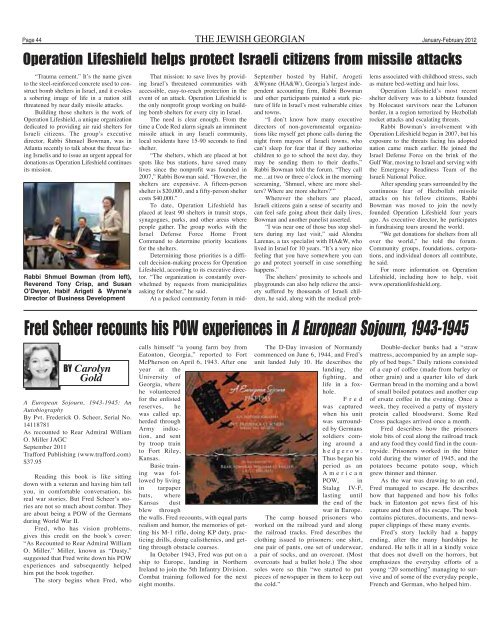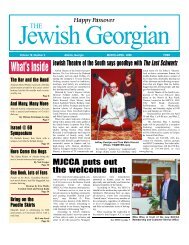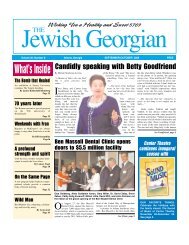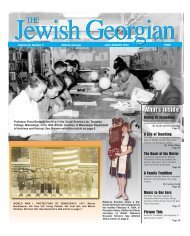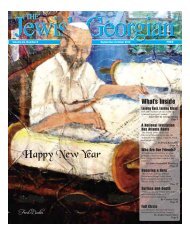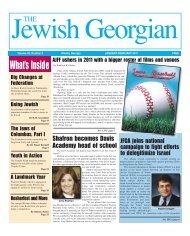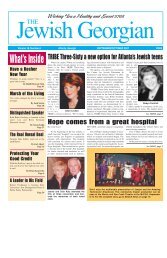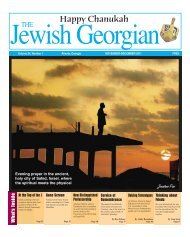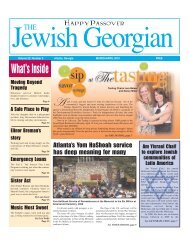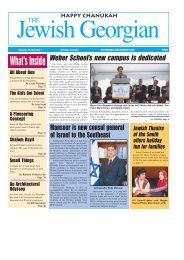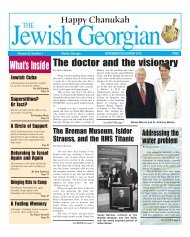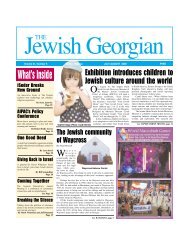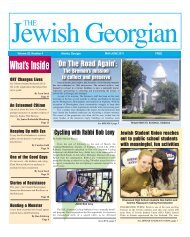January-February 2012 - The Jewish Georgian
January-February 2012 - The Jewish Georgian
January-February 2012 - The Jewish Georgian
You also want an ePaper? Increase the reach of your titles
YUMPU automatically turns print PDFs into web optimized ePapers that Google loves.
Page 44 THE JEWISH GEORGIAN <strong>January</strong>-<strong>February</strong> <strong>2012</strong><br />
Operation Lifeshield helps protect Israeli citizens from missile attacks<br />
“Trauma cement.” It’s the name given<br />
to the steel-reinforced concrete used to construct<br />
bomb shelters in Israel, and it evokes<br />
a sobering image of life in a nation still<br />
threatened by near daily missile attacks.<br />
Building those shelters is the work of<br />
Operation Lifeshield, a unique organization<br />
dedicated to providing air raid shelters for<br />
Israeli citizens. <strong>The</strong> group’s executive<br />
director, Rabbi Shmuel Bowman, was in<br />
Atlanta recently to talk about the threat facing<br />
Israelis and to issue an urgent appeal for<br />
donations as Operation Lifeshield continues<br />
its mission.<br />
Rabbi Shmuel Bowman (from left),<br />
Reverend Tony Crisp, and Susan<br />
OʼDwyer, Habif Arigeti & Wynneʼs<br />
Director of Business Development<br />
A European Sojourn, 1943-1945: An<br />
Autobiography<br />
By Pvt. Frederick O. Scheer, Serial No.<br />
14118781<br />
As recounted to Rear Admiral William<br />
O. Miller JAGC<br />
September 2011<br />
Trafford Publishing (www.trafford.com)<br />
$37.95<br />
Reading this book is like sitting<br />
down with a veteran and having him tell<br />
you, in comfortable conversation, his<br />
real war stories. But Fred Scheer’s stories<br />
are not so much about combat. <strong>The</strong>y<br />
are about being a POW of the Germans<br />
during World War II.<br />
Fred, who has vision problems,<br />
gives this credit on the book’s cover:<br />
“As Recounted to Rear Admiral William<br />
O. Miller.” Miller, known as “Dusty,”<br />
suggested that Fred write down his POW<br />
experiences and subsequently helped<br />
him put the book together.<br />
<strong>The</strong> story begins when Fred, who<br />
That mission: to save lives by providing<br />
Israel’s threatened communities with<br />
accessible, easy-to-reach protection in the<br />
event of an attack. Operation Lifeshield is<br />
the only nonprofit group working on building<br />
bomb shelters for every city in Israel.<br />
<strong>The</strong> need is clear enough. From the<br />
time a Code Red alarm signals an imminent<br />
missile attack in any Israeli community,<br />
local residents have 15-90 seconds to find<br />
shelter.<br />
“<strong>The</strong> shelters, which are placed at hot<br />
spots like bus stations, have saved many<br />
lives since the nonprofit was founded in<br />
2007,” Rabbi Bowman said. “However, the<br />
shelters are expensive. A fifteen-person<br />
shelter is $20,000, and a fifty-person shelter<br />
costs $40,000.”<br />
To date, Operation Lifeshield has<br />
placed at least 90 shelters in transit stops,<br />
synagogues, parks, and other areas where<br />
people gather. <strong>The</strong> group works with the<br />
Israel Defense Force Home Front<br />
Command to determine priority locations<br />
for the shelters.<br />
Determining those priorities is a difficult<br />
decision-making process for Operation<br />
Lifeshield, according to its executive director.<br />
“<strong>The</strong> organization is constantly overwhelmed<br />
by requests from municipalities<br />
asking for shelter,” he said.<br />
At a packed community forum in mid-<br />
calls himself “a young farm boy from<br />
Eatonton, Georgia,” reported to Fort<br />
McPherson on April 6, 1943. After one<br />
year at the<br />
University of<br />
Georgia, where<br />
he volunteered<br />
for the enlisted<br />
reserves, he<br />
was called up,<br />
herded through<br />
Army induction,<br />
and sent<br />
by troop train<br />
to Fort Riley,<br />
Kansas.<br />
Basic training<br />
was followed<br />
by living<br />
in tarpaper<br />
huts, where<br />
Kansas dust<br />
blew through<br />
the walls. Fred recounts, with equal parts<br />
realism and humor, the memories of getting<br />
his M-1 rifle, doing KP duty, practicing<br />
drills, doing calisthenics, and getting<br />
through obstacle courses.<br />
In October 1943, Fred was put on a<br />
ship to Europe, landing in Northern<br />
Ireland to join the 5th Infantry Division.<br />
Combat training followed for the next<br />
eight months.<br />
September hosted by Habif, Arogeti<br />
&Wynne (HA&W), Georgia’s largest independent<br />
accounting firm, Rabbi Bowman<br />
and other participants painted a stark picture<br />
of life in Israel’s most vulnerable cities<br />
and towns.<br />
“I don’t know how many executive<br />
directors of non-governmental organizations<br />
like myself get phone calls during the<br />
night from mayors of Israeli towns, who<br />
can’t sleep for fear that if they authorize<br />
children to go to school the next day, they<br />
may be sending them to their deaths,”<br />
Rabbi Bowman told the forum. “<strong>The</strong>y call<br />
me…at two or three o’clock in the morning<br />
screaming, ‘Shmuel, where are more shelters?<br />
Where are more shelters?’”<br />
Wherever the shelters are placed,<br />
Israeli citizens gain a sense of security and<br />
can feel safe going about their daily lives,<br />
Bowman and another panelist asserted.<br />
“I was near one of those bus stop shelters<br />
during my last visit,” said Alondra<br />
Larenas, a tax specialist with HA&W, who<br />
lived in Israel for 10 years. “It’s a very nice<br />
feeling that you have somewhere you can<br />
go and protect yourself in case something<br />
happens.”<br />
<strong>The</strong> shelters’ proximity to schools and<br />
playgrounds can also help relieve the anxiety<br />
suffered by thousands of Israeli children,<br />
he said, along with the medical prob-<br />
<strong>The</strong> D-Day invasion of Normandy<br />
commenced on June 6, 1944, and Fred’s<br />
unit landed July 10. He describes the<br />
landing, the<br />
fighting, and<br />
life in a foxhole.<br />
Fred<br />
was captured<br />
when his unit<br />
was surrounded<br />
by Germans<br />
soldiers coming<br />
around a<br />
hedgerow.<br />
Thus began his<br />
period as an<br />
American<br />
POW, in<br />
Stalag IV-F,<br />
lasting until<br />
the end of the<br />
war in Europe.<br />
<strong>The</strong> camp housed prisoners who<br />
worked on the railroad yard and along<br />
the railroad tracks. Fred describes the<br />
clothing issued to prisoners: one shirt,<br />
one pair of pants, one set of underwear,<br />
a pair of socks, and an overcoat. (Most<br />
overcoats had a bullet hole.) <strong>The</strong> shoe<br />
soles were so thin “we started to put<br />
pieces of newspaper in them to keep out<br />
the cold.”<br />
lems associated with childhood stress, such<br />
as mature bed-wetting and hair loss.<br />
Operation Lifeshield’s most recent<br />
shelter delivery was to a kibbutz founded<br />
by Holocaust survivors near the Lebanon<br />
border, in a region terrorized by Hezbollah<br />
rocket attacks and escalating threats.<br />
Rabbi Bowman’s involvement with<br />
Operation Lifeshield began in 2007, but his<br />
exposure to the threats facing his adopted<br />
nation came much earlier. He joined the<br />
Israel Defense Force on the brink of the<br />
Gulf War, moving to Israel and serving with<br />
the Emergency Readiness Team of the<br />
Israeli National Police.<br />
After spending years surrounded by the<br />
continuous fear of Hezbollah missile<br />
attacks on his fellow citizens, Rabbi<br />
Bowman was moved to join the newly<br />
founded Operation Lifeshield four years<br />
ago. As executive director, he participates<br />
in fundraising tours around the world.<br />
“We get donations for shelters from all<br />
over the world,” he told the forum.<br />
Community groups, foundations, corporations,<br />
and individual donors all contribute,<br />
he said.<br />
For more information on Operation<br />
Lifeshield, including how to help, visit<br />
www.operationlifeshield.org.<br />
Fred Scheer recounts his POW experiences in A European Sojourn, 1943-1945<br />
BY<br />
Carolyn<br />
Gold<br />
Double-decker bunks had a “straw<br />
mattress, accompanied by an ample supply<br />
of bed bugs.” Daily rations consisted<br />
of a cup of coffee (made from barley or<br />
other grain) and a quarter kilo of dark<br />
German bread in the morning and a bowl<br />
of small boiled potatoes and another cup<br />
of ersatz coffee in the evening. Once a<br />
week, they received a patty of mystery<br />
protein called bloodwurst. Some Red<br />
Cross packages arrived once a month.<br />
Fred describes how the prisoners<br />
stole bits of coal along the railroad track<br />
and any food they could find in the countryside.<br />
Prisoners worked in the bitter<br />
cold during the winter of 1945, and the<br />
potatoes became potato soup, which<br />
grew thinner and thinner.<br />
As the war was drawing to an end,<br />
Fred managed to escape. He describes<br />
how that happened and how his folks<br />
back in Eatonton got news first of his<br />
capture and then of his escape. <strong>The</strong> book<br />
contains pictures, documents, and newspaper<br />
clippings of these many events.<br />
Fred’s story luckily had a happy<br />
ending, after the many hardships he<br />
endured. He tells it all in a kindly voice<br />
that does not dwell on the horrors, but<br />
emphasizes the everyday efforts of a<br />
young “20 something” managing to survive<br />
and of some of the everyday people,<br />
French and German, who helped him.


